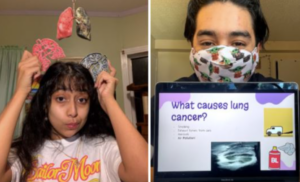
Medical & Cancer STEM Programs: A continued success story in virtual times
Since 2018, the USC Norris Comprehensive Cancer Center (NCCC) has supported the implementation of a cancer education curriculum with five second grade classrooms through a program called the Medical STEM Program (MSP), which is a component of USC NCCC’s Cancer-STEM Education Partnership Program (C-SEPP) . This includes virtual programming because of the COVID-19 pandemic. Spring 2021 marks the second online semester for the program, which focuses on concepts in the cancer biology field. We thank our partner teachers (Ms. Robles, Ms. Ramirez, Mr. Nakama at Vermont Elementary, Ms. Finnon at Weemes Elementary and Ms. Kim at the Dr. Theodore Alexander Science Center School) for their continuous support and for hosting MSP in their LAUSD Zoom Rooms. All of the program’s hands-on in person curriculum had to be reimagined for the virtual world and for this semester, three units were taught over the course of the semester including laboratory science, dermatology and pulmonology.
Centered around the basics of laboratory research, the first unit covered topics like liquid volume tools, measuring mass and a dedicated lesson on microscopes. Abstract concepts like measuring volume and mass were taught to the students by asking them to fetch objects in their homes that could be measured for their volume and mass. As the teaching progressed, we utilized online video resources to make the lessons more interactive. For example, the microscope lesson was completely video demonstration-based and was also the most popular lesson amongst the students.
The second unit of teaching was centered around topics related to Dermatology. The main topics covered included the harmful effects of ultraviolet radiation (UV) on skin and cancers associated with it. Students learned the basics of skin cancer diagnosis using ABCDE’s – Asymmetry, Barriers, Color, Diameter and Evolving – as the differentiating factors between a benign vs a cancerous mole.
MSP TA Angelina Crittenden demonstrating the effects of UV radiation on bare vs protected skin. She is pictured with protective gears like sunglasses and an umbrella that protect us from harmful rays of the sun.
The last unit was Pulmonology, where students learned how lungs function, how pollutants persist in the air we breathe and how smoking can cause diseases, especially cancer. The last lesson this semester emphasized the importance of using filters like masks to protect oneself from airborne-pathogens and was very relevant to continue to protect oneself from COVID-19.
Teaching online has been fun but also an immense learning experience for C-SEPP’s MSP team. Using the lessons learned from Fall 2020, we have incorporated physical movement to encourage students’ participation and engagement in various lessons. For example, one of our TA’s, Jisu Kim, would incorporate movement breaks during her lessons, such as neck stretches and jumping jacks.
We concluded teaching in the classrooms by inviting guest speakers to each of the classrooms. The speakers for Spring 2021 were:
- DJ Fernandez, a PhD Candidate studying HPV induced cervical cancer in Dr. W. Martin Kast’s lab at USC NCCC
- Rachel Klaus – Anatomist from Experience Anatomy
- Lisa Welter, a PhD Candidate in Molecular Biology studying breast cancer at the Michelson Center
- Dr. Evanthia Roussos Torres, Assistant Professor of Medicine who studies immune-oncology with a specific focus on breast cancer.
The speakers were amazed at the children’s curiosity, participation and familiarity with the biology of cancer. This format of the program has helped the students get an all-around perspective of cancer education and how scientists and doctors are integral to the field. One of the speakers, Dr. Torres, said “I really enjoyed getting to talk to the students about cancer. The kids were great and fun to talk to!” Another speaker, DJ Fernandez, said “I care deeply about encouraging kids to think critically and scientifically and will always have time for it. I had a blast”. Lastly, Lisa Welter stated that she “loved that some of [the children] actually are thinking of becoming engineers, scientists or doctors and I really hope that they will find the strength and means to pursue their dreams.”
When asked about the virtual learning experience through MSP, one of our teachers, Mr. Daniel Nakama, said “This program opens another door for students. I believe that many students feel trapped, but the reality is that there are many doors and paths that the students can take. They just have to be encouraged and invited to open those doors. Thanks for inviting my students to open the “STEM” door. MSP staff member, Haig Manoukian, concurred: “Being an MSP TA has shown me the important role teachers play in the lives of young students. I feel that we help foster curiosity in the students we teach and while they may not remember the names of the layers of skin for example, I’m certain that the lessons we provide encourage the students to continue to ask questions about the world around them. That’s what it’s all about.”